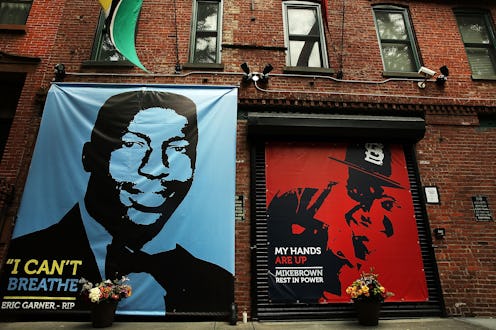On Wednesday afternoon, a New York City grand jury decided not to indict white police officer Daniel Pantaleo in the chokehold death of Eric Garner, an unarmed black man. The decision came only a week after a Missouri grand jury found another white police officer, Darren Wilson, not guilty in the shooting death of Michael Brown, an unarmed black teenager. The streets have since erupted in protest — and Twitter has also exploded with tweets about racial profiling and police brutality, real-world protests, and the life experiences of black Americans.
On Wednesday afternoon, 69,000 tweets tagged #EricGarner were written per hour, and the social media site allowed tweeters to do more than just to make their outrage known — a series of hashtags allowed people to quickly and efficiently organize massive protests throughout the entire country on Wednesday and Thursday, and expose the police harassment that black Americans are exposed to on a regular basis.
As of Friday, the hashtags are still going strong, filling timelines with images of last night's protests, news and updates about the impact of the protests, and expressions of both sadness and hope. Here's a roundup of nine crucial hashtags responding to the case.
#ICantBreathe
Garner's final words, as he was murdered by a police chokehold, have become a rallying cry for protesters —both in real life, and for those commenting on the verdict online, planning and publicizing protests, and paying tribute to Garner's memory.
#EricGarner
A source for information about and footage from protests, related news articles, and other information about racial profiling and police brutality, this hashtag is among the most popular for communicating information about the case.
#CrimingWhileWhite
This hashtag, created by a writer on the staff at Jimmy Fallon's show, aimed to point out the disparity in how white and black people are treated by police by having white people recall times they were not arrested or charged after committing crimes. But critics soon rightly pointed out that, though the hashtag's heart was in the right place, it placed the spotlight on white experiences, rather than calling attention to black experiences and the mistreatment that black Americans have regularly suffered at the hands of police.
And by this morning, the hashtag had mostly been overtaken by jokes and racist tweets from white tweeters.
#AliveWhileBlack
In response to #CrimingWhileWhite, #AliveWhileBlack, created by Ebony senior digital editor Jamilah Lemieux, catalogued the profiling, harassment, and police brutality that black Americans face every day while simply trying to live their lives.
#LivingWhileBlack
Similarly, this hashtag documented incidences of police brutality, harassment, and everyday racism experienced by black Americans.
#ShutItDown
Beginning with the Ferguson protests, this hashtag expanded to also cover the national protests against the Garner verdict, allowing tweeters across the country to organize, see pictures of protests as they happened in other cities, and share important information as the marches developed.
#ItEndsToday
This hashtag, which quoted Garner's words to cops before he was murdered, mixed protest coverage with historical information about police brutality.
#WeHearYou
NYPD Chief Joanne Jaffe attempted to make a public statement in the hours after the Garner verdict with this hashtag, which immediately backfired as critics called out the insincerity of her statement.
#BlackLivesMatter
This hashtag, created in 2012 after George Zimmerman was acquitted of the death of Trayvon Martin, continues to allow tweeters to report on breaking news, opinions, and protests about police violence against unarmed black men, as well as remind readers about the real issue at hand.
